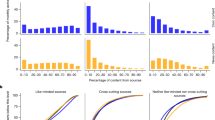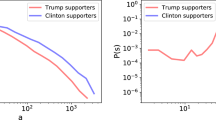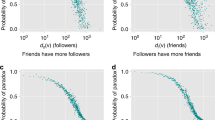Abstract
Human behaviour is thought to spread through face-to-face social networks, but it is difficult to identify social influence effects in observational studies9,10,11,12,13, and it is unknown whether online social networks operate in the same way14–19. Here we report results from a randomized controlled trial of political mobilization messages delivered to 61 million Facebook users during the 2010 US congressional elections. The results show that the messages directly influenced political self-expression, information seeking and real-world voting behaviour of millions of people. Furthermore, the messages not only influenced the users who received them but also the users’ friends, and friends of friends. The effect of social transmission on real-world voting was greater than the direct effect of the messages themselves, and nearly all the transmission occurred between ‘close friends’ who were more likely to have a face-to-face relationship. These results suggest that strong ties are instrumental for spreading both online and real-world behaviour in human social networks.
This is a preview of subscription content, access via your institution
Access options
Subscribe to this journal
Receive 51 print issues and online access
$199.00 per year
only $3.90 per issue
Buy this article
- Purchase on Springer Link
- Instant access to full article PDF
Prices may be subject to local taxes which are calculated during checkout


Similar content being viewed by others
References
Berger, J. & Le Mens, G. How adoption speed affects the abandonment of cultural tastes. Proc. Natl Acad. Sci. USA 106, 8146–8150 (2009)
Borgatti, S. P. et al. Network analysis in the social sciences. Science 323, 892–895 (2009)
Ohtsuki, H., Hauert, C., Lieberman, E. & Nowak, M. A. A simple rule for the evolution of cooperation on graphs and social networks. Nature 441, 502–505 (2006)
Onnela, J. P. & Reed-Tsochas, F. Spontaneous emergence of social influence in online systems. Proc. Natl Acad. Sci. USA 107, 18375–18380 (2010)
Apicella, C. L., Marlowe, F. W., Fowler, J. H. & Christakis, N. A. Social networks and cooperation in hunter-gatherers. Nature 481, 497–501 (2012)
Aral, S. & Walker, D. Identifying influential and susceptible members of social networks. Science 337, 337–341 (2012)
Centola, D. An experimental study of homophily in the adoption of health behavior. Science 334, 1269–1272 (2011)
Gonzalez-Bailon, S., Borge-Holthofer, J., Rivero, A. & Moreno, Y. The dynamics of protest recruitment through an online network. Sci. Rep. 1, 197 (2011)
Christakis, N. A. & Fowler, J. H. Social contagion theory: examining dynamic social networks and human behavior. Preprint at http://arXiv.org/abs/1109.5235v2 (2011)
Aral, S., Muchnik, L. & Sundararajan, A. Distinguishing influence-based contagion from homophily-driven diffusion in dynamic networks. Proc. Natl Acad. Sci. USA 106, 21544–21549 (2009)
Christakis, N. A. & Fowler, J. H. The spread of obesity in a large social network over 32 years. N. Engl. J. Med. 357, 370–379 (2007)
Fowler, J. H. & Christakis, N. A. The dynamic spread of happiness in a large social network. Br. Med. J. 337, a2338 (2008)
Christakis, N. A. & Fowler, J. H. The collective dynamics of smoking in a large social network. N. Engl. J. Med. 358, 2249–2258 (2008)
Salganik, M. J., Dodds, P. S. & Watts, D. J. Experimental study of inequality and unpredictability in an artificial cultural market. Science 311, 854–856 (2006)
Centola, D. The spread of behavior in an online social network experiment. Science 329, 1194–1197 (2010)
Fowler, J. H. & Christakis, N. A. Cooperative behavior cascades in human social networks. Proc. Natl Acad. Sci. USA 107, 5334–5338 (2010)
Lazer, D. et al. Computational social science. Science 323, 721–723 (2009)
Ellison, N. B., Steinfield, C. & Lampe, C. The benefits of facebook “friends:” Social capital and college students’ use of online social network sites. J. Comput. Mediat. Commun. 12, 1143–1168 (2007)
Traud, A. L., Kelsic, E. D., Mucha, P. J. & Porter, M. A. Comparing community structure to characteristics in online collegiate social networks. SIAM Rev. 53, 526–543 (2011)
Granovetter, M. The strength of weak ties. Am. J. Sociol. 78, 1360–1380 (1973)
Christakis, N. A. & Fowler, J. H. Connected: The Surprising Power of Our Social Networks and How They Shape Our Lives (Little, Brown, and Company, 2009)
Nickerson, D. W. Does email boost turnout? Q. J. Polit. Sci. 2, 369–379 (2007)
Kenny, C. B. Political participation and effects from the social environment. Am. J. Pol. Sci. 36, 259–267 (1992)
Huckfeldt, R. & Sprague, J. Citizens, Politics, and Social Communication: Information and Influence in an Election Campaign (Cambridge Univ. Press, 1995)
Gerber, A. S. & Green, D. P. Does canvassing increase voter turnout? A field experiment. Proc. Natl Acad. Sci. USA 96, 10939–10942 (1999)
Gerber, A. S., Green, D. P. & Larimer, C. W. Social pressure and voter turnout: evidence from a large-scale field experiment. Am. Polit. Sci. Rev. 102, 33–48 (2008)
Bryan, C. J., Walton, G. M., Rogers, T. & Dwecka, C. S. Motivating voter turnout by invoking the self. Proc. Natl Acad. Sci. USA 108, 12653–12656 (2011)
Nickerson, D. W. Is voting contagious? Evidence from two field experiments. Am. Polit. Sci. Rev. 102, 49–57 (2008)
Vitak, J. et al. It's complicated: Facebook users' political participation in the 2008 election. Cyberpsychol. Behav. Soc. Netw. 14, 107–114 (2011)
Fowler, J. H. in The Social Logic of Politics: Personal Networks as Contexts for Political Behavior (ed. Zuckerman, A. ) 269–287 (Temple Univ. Press, 2005)
Acknowledgements
We are grateful to S. Aral, J. Berger, M. Cebrian, D. Centola, N. Christakis, C. Dawes, L. Gee, D. Green, C. Kam, P. Loewen, P. Mucha, J. P. Onnela, M. Porter, O. Smirnov and C. Volden for comments on early drafts. This work was supported in part by the James S. McDonnell Foundation, and the University of Notre Dame and the John Templeton Foundation as part of the Science of Generosity Initiative.
Author information
Authors and Affiliations
Contributions
Author Contributions All authors contributed to study design, data collection, analysis and preparation of the manuscript. J.H.F. secured funding.
Corresponding author
Ethics declarations
Competing interests
The authors declare no competing financial interests.
Supplementary information
Supplementary Information
This file contains Supplementary Text and Data, Supplementary Tables 1-19, Supplementary Figures 1-6 and additional references. (PDF 4524 kb)
PowerPoint slides
Rights and permissions
About this article
Cite this article
Bond, R., Fariss, C., Jones, J. et al. A 61-million-person experiment in social influence and political mobilization. Nature 489, 295–298 (2012). https://doi.org/10.1038/nature11421
Received:
Accepted:
Published:
Issue Date:
DOI: https://doi.org/10.1038/nature11421
This article is cited by
-
Status invisibility alleviates the economic gradient in happiness in social network experiments
Nature Mental Health (2023)
-
Negativity drives online news consumption
Nature Human Behaviour (2023)
-
People conform to social norms when gambling with lives or money
Scientific Reports (2023)
-
AI-deploying organizations are key to addressing ‘perfect storm’ of AI risks
AI and Ethics (2023)
-
Optimizing whose engagement? Beliefs and protest participation of social media users in South Korea
AI and Ethics (2023)
Comments
By submitting a comment you agree to abide by our Terms and Community Guidelines. If you find something abusive or that does not comply with our terms or guidelines please flag it as inappropriate.



